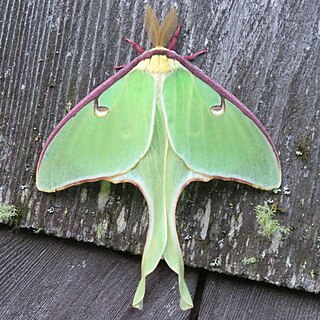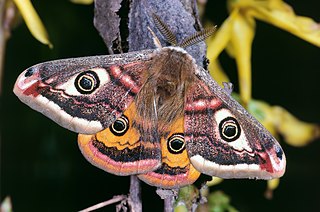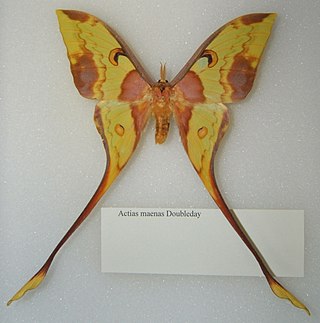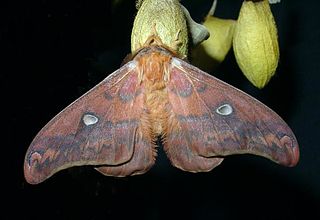
The luna moth, also called the American moon moth, is a Nearctic moth in the family Saturniidae, subfamily Saturniinae, a group commonly named the giant silk moths.

Saturniidae, members of which are commonly named the saturniids, is a family of Lepidoptera with an estimated 2,300 described species. The family contains some of the largest species of moths in the world. Notable members include the emperor moths, royal moths, and giant silk moths.

The Malaysian moon moth is a Saturniid in the subfamily Saturniinae from Indomalaya. The male is purplish-brown and yellow, while the larger female is overall light green.

Actias is a genus of Saturniid moths, which contains the Asian-American moon moths. Long tails on their hindwings are among their distinctive traits. Other moths with similar appearance are Copiopteryx, Argema and Eudaemonia.

Graellsia isabellae, the Spanish moon moth, is in the silkmoth family Saturniidae. It is the only species in the monotypic genus Graellsia. The species was first described by Mariano de la Paz Graells y de la Agüera in 1849 and the genus was erected by Augustus Radcliffe Grote in 1896.

Actias ningpoana, the Chinese moon moth, is a moth of the family Saturniidae. The species was first described by father-and-son entomologists Cajetan and Rudolf Felder in 1862. It is quite large, and has long, curved, hindwing tails. There are many congeners across Asia; the Luna moth of Eastern Canada and the United States is a close relative.

Actias sinensis, the Golden moon moth, is a moth of the Family Saturniidae. It is found in China, Taiwan, Vietnam, Myanmar, India and Thailand. The species was first described by Francis Walker in 1855.

Actias truncatipennis is an uncommon moth of the family Saturniidae that is found in Mexico. The species was first described by Léon Sonthonnax in 1899.

Georgy Sergeevich Zolotarenko, ScDr., professor, was a Russian entomologist specialized in Lepidoptera, mainly Noctuidae: Noctuinae.

Actias neidhoederi is a moth belonging to the Actias Leach of Saturniidae. It is a species endemic to Taiwan.。

Actias groenendaeli is a moth of the family Saturniidae first described by Roepke in 1954. It is found in Indonesia.
Actias angulocaudata is a moth in the family Saturniidae described by Stefan Naumann and Thierry Bouyer in 1998. It is found in China and Laos.
Actias callandra, the Andaman moon moth, is a moth in the family Saturniidae. It is found in India.

Actias chapae or colloquially known as the 'celestial moon moth' is a moth in the family Saturniidae. It is found in Vietnam and China and potentially other countries in the region; it is a montane species recorded from 1500m and higher. It appears to be an exclusive pine feeder and has been raised on many different species of Pinus in captivity.
Actias felicis is a moth in the family Saturniidae. It is found in China (Tibet).

Actias parasinensis, the Western Golden moon moth, is a moth in the family Saturniidae. It is found in Bhutan, India, Thailand, Laos and Vietnam.

Actias aliena is a moth in the family Saturniidae. It is found in Japan. Its mitochondrial genome has been sequenced.

Actias keralana is a species of moth of the family Saturniidae described by Wolfgang A. Nässig, Stefan Naumann and Alessandro Giusti in 2020. It is native to southern India.

Rhodinia fugax, the squeaking silkmoth, is a moth in the family Saturniidae. It was described by Arthur Gardiner Butler in 1877. It is native to Korea, Japan, China, and the Russian Far East.
















